2024 Election

I WRITE THIS two months before the November 2024 U.S. presidential election, knowing that it will land with you, dear readers, after all the votes are in and the course for the next four years is likely set. My insides lurch thinking about the potential outcomes. We are in the middle of the decisive decade for large-scale action to mitigate the worsening effects of climate change. Going in one direction or the other feels, sometimes, like a turn toward life or death for the planet.
Like many, I have learned to apply lessons from navigating the grief and pain of personal losses to our collective crises. I lost my dad suddenly to colon cancer earlier this year. A few weeks later, my mom was diagnosed with stomach cancer. Grasping for predictability amid the unknown, I tried to superimpose my dad’s illness onto my mom’s future. It did not help. My anxiety skyrocketed.
What helped, instead, was applying what Zen practitioners call “beginner’s mind.” A beginner has no background knowledge about a situation. They have no expectations for how things might unfurl. Approaching a situation as a beginner can open pathways that experts did not see.
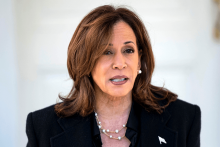
In an interview with NBC’s Hallie Jackson on Tuesday, Vice President Kamala Harris suggested she would not make concessions for religious exemptions on abortion laws, one of her strongest allusions yet to where she plans to take the abortion debate if she wins the White House in November.

God’s first house — the tabernacle — is movable, following the Israelites as they wander from Egypt to Canaan (Exodus 40:34; Numbers 1:47-53). The theme of migration continues into Jesus’ life, where Matthew’s gospel tells us that he fled political violence and spent much of his childhood in Egypt (Matthew 2:13-23). Even when he is back in his own country, he is unwelcome in his hometown and “has nowhere to lay his head” (Matthew 8:20).
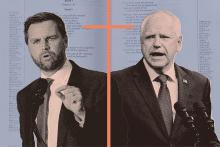
As Republican Ohio Senator JD Vance and his Democratic opponent, Minnesota Governor Tim Walz, compete for the vice presidency ahead of the November election, they bring distinct religious backgrounds — and distinct approaches to the role of faith in public life.
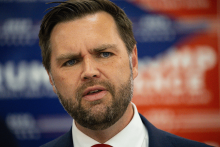
Republican vice presidential nominee JD Vance attended a town hall outside Pittsburgh on Saturday hosted by a Christian nationalist televangelist who believes that Democrat Kamala Harris has an “occult spirit” that runs through her, that she represents the “spirit of Jezebel,” and that she used “witchcraft” during the September presidential debate.
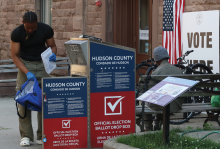
POLL WORKERS ARE everyday people, who are well trained in the process, who step up and serve their communities. Poll workers and election officials at all different polling locations have very strict guidelines on how to handle the equipment and the ballots. You can see these people, in real time, handling these things effectively and following the rules.
Both as a democracy advocate and as a Christian, I put a big value on honesty and on the truth. A democracy needs well-informed people who understand what the truth is, and we need leaders who make decisions based on the truth.
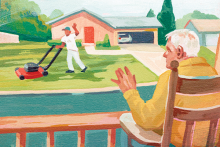
ELECTIONS ARE UPON us. The electoral choices we make, or do not make, have far-reaching implications both for this country and others, for us and future generations.
Four years ago, I gave up my Indian citizenship and became an American citizen to vote in the U.S. general election in 2020. At that time, it seemed like the most important election in my life — and I wanted to have a say in it. Astonishingly, the stakes for elections this November feel as anxiety-inducing and consequential, if not more, than four years ago.
Such fears notwithstanding, as people of faith we vote from a place of hope, not despair. As Christians in a powerful nation, we have a particular responsibility to vote, not just for ourselves but with sensitivity to the Body of Christ around the world. Voting in democratic systems such as ours models a nonviolent transfer of power. We vote for ourselves and for our neighbors. We vote because elections afford us an opportunity to pursue a just and fair future for our communities and country. Elections can give legislative framework to a full range of our faith commitments; ensure that our public institutions serve the poor rather than exploit them; and shape our country into the multiethnic, multireligious, economically equitable democracy it is intended to be. Our votes can contribute to the transformations we envision.
This election season, all people of faith and good conscience must reflect deeply, organize effectively, and vote diligently to elect competent and compassionate leadership. May we choose our leaders wisely.

NOSTALGIA IS THE LEVERAGE of the powerful. When weaponized, it serves as a deft political tool. It plays on the sentiments of the disgruntled and disenfranchised. It creates a one-dimensional patriotism that never tells the full story. It preserves the story of privilege.
One white comedian reflected, “Here’s how great it is to be white: I could get in a time machine and go to any time, and it would be ... awesome when I get there,” he says. “That is exclusively a white privilege. ... A Black guy in a time machine is like, ‘Hey, if it’s before 1980, no thank you. I don’t wanna go.’” While this made for good comedic insight, many of my siblings of European ancestry who know the history of their ancestors — religious persecution and violence motivated some of their journeys to the shores of North America — also might not want to escape too far back in time.

In Against Me!’s song “I Was a Teenage Anarchist,” Laura Jane Grace sings, “I was a teenage anarchist / But the politics were too convenient.” The song is a catchy tune that has stuck with me, even if I’ve outgrown the punk-rock-emo scene. But unlike Grace, I have not outgrown my anarchistic impulses.
Popularly, anarchy is associated with “chaos,” but I think of it more in terms of avant-garde jazz, where everyone is working together in their own unique way to create a sort of consensus.
So, when I recently heard of a new book focused entirely on the nexus between anarchism and Christianity, I had to investigate.

Armed with the message that Americans have become too morally liberal and strayed too far from God’s light, a few Black conservative Christians, like Pastor Lorenzo Sewell, are trying to upend the historic support of Black Protestants for the Democratic party.

While evangelical political engagement remains solidly in favor of Republicans, a group of evangelical leaders are organizing their support for Vice President Kamala Harris and Gov. Tim Walz in the upcoming presidential election.
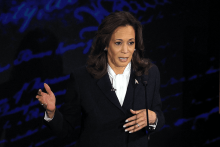
As Vice President Kamala Harris and former President Donald Trump discussed abortion policy during their first debate, Harris vigorously defended her vision for federal abortion rights. While she did, she returned to a talking point meant to appeal to religious voters.
“[Under Trump’s abortion bans] a survivor of a crime — a violation to their body — does not have the right to make a decision about what happens to their body next. That is immoral,” Harris said, before connecting morality and faith. “And one does not have to abandon their faith or deeply held beliefs to agree: The government, and Donald Trump certainly, should not be telling a woman what to do with her body.”
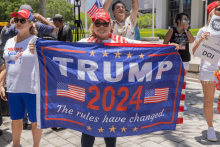
But while assessing who wins a debate can be fairly subjective, determining who wins the upcoming election can’t — or shouldn’t be. As we’ve learned since 2020, confidence in our electoral system has increasingly become a partisan issue, with over 70 percent of Republican voters believing that President Joe Biden’s win in 2020 was illegitimate, a belief fueled by the pernicious, big lie that the election was stolen due to widespread voter fraud. Changing these numbers and restoring bipartisan confidence in our electoral system will require real work — and leadership from our elected officials.
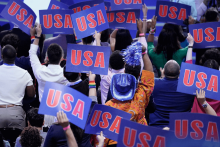
Christian engagement in American patriotism has often gotten a bad rap, and rightly so: All too often, a healthy love for one’s country (patriotism) seeps into a pernicious love of blood and soil (nationalism), with the latter often marked by a sense of superiority, domination, or ethnocentrism. But instead of offering a strong counter-witness to these toxic impulses, Christians in the U.S. have often led the way, twisting the gospel to support American nationalism. Understandably, some Christians — both now and in the past — have responded by rejecting nationalistic forms of patriotism as something incompatible with following Jesus. As a Christian, I believe the answer isn’t to altogether reject patriotism, but instead to redeem it.

About a month into her presidential campaign, Vice President Kamala Harris has begun to reveal glimpses of her proposed White House policy agenda. The big-ticket items — child tax credits, housing incentives, and inflation relief on groceries — are aimed at the segment of the population most affected by the skyrocketing cost of living: young working families. It’s a focus child welfare advocates are welcoming.

“You do not want to be beholden to anything but God and your moral values,” Butler told Sojourners. “If I see the Democratic Party running astray from that, then I will criticize them. If they ever became a party of violence and mayhem and chaos, like the Republican Party has become, I would pray to God that I have the courage that so many ‘Never Trump’ Republicans have had. Stepping out in the crowd is an exceptionally hard thing to do.”
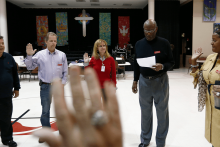
It goes without saying that we’ve got plenty of dread to spare this year. Since President Joe Biden won the presidency in 2020, former President Donald Trump and his allies have falsely claimed that the election was rigged. Millions of Americans agree. Meanwhile, many other Americans fear how far Trump could take his authoritarian impulses in a second term. As our political culture becomes more tightly wound, the nuts and bolts of our democracy seem to be coming loose. For the average citizen, it can be hard to verify every claim we see circulated in partisan media or online. Despite election law being clear that a party can choose its nominee at convention, for example, many Republicans claimed it was “too late” for Biden to step down from his reelection campaign.

When President Joe Biden announced he would not seek reelection and Harris became the presumptive nominee, leaders in faith and immigration said that Harris brings a new outlook to the future of their work.

When election season rolls around, both politicians will no doubt hope to have the votes of people living at or near poverty, particularly those living in the urban centers of swing states. But what hope can people experiencing poverty have that their government has their best interests at heart when most candidates only seem to acknowledge their existence as voters rather than as people with inherent dignity and very specific and urgent needs?

Latinos do not always support candidates with progressive immigration policies — including policies that expand legal pathways to citizenship, enforce fewer penalties for those who immigrate without documentation, or end sanctions that devastate economies and fuel immigration. Experts and members of the community say Latinos of faith, with or without an immigration background, can feel torn between theologies that emphasize respect for the rule of law, a cultural emphasis on the family, allegiances to denominations that encourage support for conservative candidates, and their own personal trajectories.